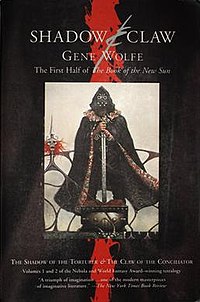The Book of the New Sun
From Wikipedia, the free encyclopedia
| The Book of the New Sun | |
 |
|
| Author | Gene Wolfe |
|---|---|
| Country | United States |
| Language | English |
| Series | The Book of the New Sun |
| Genre(s) | Science fiction |
| Publisher | Orb Books |
| Publication date | 1980-1983 |
| ISBN | 0-312-89017-6 and 0-312-89018-4 |
The Book of the New Sun is a novel in four parts written (1980–83) by science fiction and fantasy author Gene Wolfe. It chronicles the journey and ascent to power of Severian, a disgraced journeyman torturer who rises to the position of Autarch, the one ruler of the free world. Severian, who claims that he has perfect memory, tells the story in first person; the books are presented by Wolfe as a translation of Severian's writings into contemporary English. The series takes place in the distant future, where the Sun has dimmed considerably and the Earth (referred to in the series as "Urth") is slowly cooling.
The four volumes in the series are:
- The Shadow of the Torturer (nominated for the 1980 Nebula Award, winner of the 1981 World Fantasy Award)
- The Claw of the Conciliator (nominated for the 1982 Hugo Award, winner of the 1981 Nebula Award)
- The Sword of the Lictor (nominated for the 1983 Hugo Award and the 1982 Nebula Award)
- The Citadel of the Autarch (nominated for the 1983 Nebula Award).
A coda, The Urth of the New Sun (nominated for the 1988 Hugo Award and Nebula Award), which takes place several years after the events of The Book of the New Sun, was added later. Wolfe has since written two series that exist loosely within Severian's universe, The Book of the Long Sun (a four-book series set on a generation ship; two of the books were nominated for Nebula Awards) and The Book of the Short Sun (a three-book series following the inhabitants of the generation ship after their long journey has finally finished).
Contents |
[edit] Place within the genre
The New Sun series belongs to the Dying Earth subgenre (a title inspired by Jack Vance's popular Dying Earth series), a kind of science fiction/fantasy set in a distant future when the Sun is dying, set against a background of mysterious and obscure powers and events.
[edit] Language
The Book of the New Sun has been widely analyzed for its deeper meanings; some of these analyses have been published, such as Michael Andre-Druissi's Lexicon Urthus (ISBN 0-9642795-9-2) and Robert Borski's Solar Labyrinth. Wolfe makes extensive use of allegory within the series, as Severian is identified as a Christ/Apollo figure: he is destined to revitalize the Sun and save the Earth while at the same time destroying it. Adding further to the books' many riddles is Wolfe's usage of archaic, obscure (but never invented) words to describe the world of the far future. Wolfe explains that this is one of the difficulties in translating Severian's writing ("in a tongue that has not yet achieved existence") into English. An example can be found in Severian's fuligin cloak ("the color that is darker than black"), probably derived from fuliginous, an obscure and archaic word meaning sooty.[1] Other examples are optimates, named for a political party in Republican Rome, aquastor, a spiritual being that appears in the works of Paracelsus, and fiacre, a small carriage (which is, in fact, a French word with that meaning).
[edit] Interpretations
| This section does not cite any references or sources. Please help improve this article by adding citations to reliable sources. Unverifiable material may be challenged and removed. (June 2008) |
Interpretations abound in a variety of other books such as Michael Andre Druissi's Lexicon Urthus, Peter Wright's Attending Daedalus, John Clute's Strokes, and Robert Borski's Solar Labyrinth. Among other theories:
- Severian's home city of Nessus is actually a future Buenos Aires.
- The characters Agia and Agilus are Severian's cousins.
- Father Inire and Ossipago are not only the same character, but the offspring of Severian and one of the Hierodules.
- Wolfe's earlier book, The Fifth Head of Cerberus is in fact set in the same universe, and is a prequel to the Book of the New Sun, the Book of the Long Sun, and the successor Short Sun books.
- Severian's companion and lover Dorcas is his paternal grandmother (Ouen the waiter is her son).
- The Autarch is Thecla's father.
- Merryn is Severian's sister. Alternatively, as proposed by Robert Borski, Jolenta may be Severian's sister.
[edit] See also
[edit] References
| Wikiquote has a collection of quotations related to: The Book of the New Sun |
- ^ (1979). The Compact Edition of the Oxford English Dictionary (A-O). Oxford University Press, New York, New York.
- ISBN 0-312-89017-6—Volume 1, Shadow & Claw
- ISBN 0-312-89018-4—Volume 2, Sword & Citadel
John Clute, Strokes, Serconia Press, 1988.
[edit] External links
- "What Gene Wolfe Expects of His Readers: The Urth of the New Sun as an Answer to Mysteries in The Book of the New Sun", by Michael Andre-Driussi
|
|||||||||||

